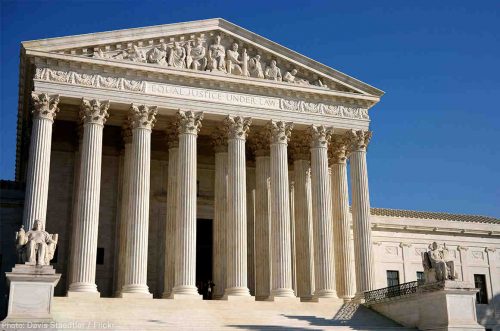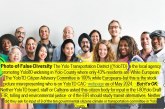
By Amanda Shanor
The Constitution protects the fundamental freedoms of speech and association. It protects all speakers equally. Until it doesn’t — as the Supreme Court made clear on the last day of the term, in its highly anticipated decision in Janus v. American Federation of State, County, and Municipal Employees. The case pitted the First Amendment claims of anti-union public-sector employees against the interests of pro-union employees and employers. And instead of reaching a careful balance, the court sided entirely with the rights of some over the rights of others.
For nearly half a century, the court had embraced a compromise that balanced the First Amendment rights of employees who oppose a union, on the one hand, and employees who support that union on the other. In Janus, a 5-4 majority composed of the court’s conservative justices chose to protect only the speech of employees who oppose unions. It protected, in short, only the speech it liked.
At stake in Janus was whether it violates the First Amendment for a state to authorize a public employee union to collect a “fair share fee” from nonmembers for the cost of benefits that the union is legally required to provide all employees, such as representing them in grievance procedures against the employer.
Over 40 years ago, in Abood v. Detroit Board of Education, the court crafted a stable compromise to balance the various interests, including First Amendment rights, at stake in public workplaces. It held that public employees who choose not to join a union can be charged fees to cover the costs of benefits the union has to provide them — but cannot be compelled to join the union or pay for its ideological speech. Such fees, the court reasoned, “distribute fairly the cost” of providing the benefits “among those who benefit” by permitting the union to seek reimbursement for expenses it must pay. Abood’s balance also recognized the interest of governmental employers to choose to deal  with a single union to further labor peace.
with a single union to further labor peace.
The court in Janus threw out that compromise and adopted two transparently flawed arguments.
First, it shrugged off the interests of pro-union employees. It rejected Abood’s reasoning that the First Amendment permits everyone to pick up their own costs. Instead, the court held that pro-union employees must pay the costs of anti-union employees. The majority, in short, gave constitutional imprimatur to free riders. That is the opposite of the evenhandedness the First Amendment requires. Now, under Janus, it protects the right to get something for nothing.
Second, the court disregarded the interests of communities, through their representatives, to choose to work with unions to manage public workplaces. In so doing, the court turned its back on a fundamental distinction in First Amendment law: that governments as employers have greater latitude to regulate their employees’ speech than they have when regulating citizens at large. If I were a lawyer for the government, for example, I would not have a First Amendment right to argue anything I wanted to in court — even if the government could not stop me from making the same argument as a private citizen on a street corner.
Governments have greater latitude to manage employees who work for them, including what they say. The court ignored that distinction in Janus, saying that it is different when government employers regulate an individual employee’s speech instead of groups of employees. But that makes no sense. Most rules at work apply to employees generally. It is unthinkable that the court intended to strip public school administrators of their authority, say, to stop a group of teachers from protesting in the cafeteria, simply because the rule against doing so applied across the board. Rather, it appears that the majority created an unprincipled “unions only” carve-out to First Amendment law.
The decision in Janus directly undermines the interests of those who want to associate in a union. Now they have to pay not only for their own services but for services they are legally required to provide to others. It is particularly troubling because public-sector unions often represent the voices of communities and economic interests that are increasingly marginalized. The court authorized free riders to drain these unions of already limited resources. And it dismisses the interests of governments and the people they represent, including nearly half the states plus the District of Columbia and Puerto Rico, that work productively with unions and think fair share agreements make for good labor relations and better governance.
But the decision is also a tragedy for American democracy and the First Amendment and for the legitimacy of the Supreme Court. In our democracy, the First Amendment is supposed to protect all voices equally. Neither it, nor the court, is supposed to take political sides. The First Amendment has, instead, long been heralded as “the guardian of our democracy.” That it must ensure open debate — not pick winners and losers — has long been accepted as “a fundamental principle of our constitutional system.”
The Janus decision reads as the product of a politicized court choosing to protect the speech, and political interests, that it prefers. As Justice Kagan wrote in a powerful dissent: “The First Amendment was meant for better things.”
Amanda Shanor is a Staff Attorney with the American Civil Liberties Union






But the ACLU consistently promotes the voice of the weak to be heard over the voice of the powerful. I guess except when the voice is the powerful labor unions. Look deeply and I am sure you will find a money connection.
Untrue… myth that unions spout…
‘Interests’ are not ‘rights’…
No such right, unless you think welfare, SNAP, getting benefits from charitable contributions, are “rights”…
Even if true, who would want the union representing them in such a grievance if you decidedly disagree with the union? A friend who used to work where I do asked the union to represent him on such a matter, and he said they were worthless. We had a job category get ignored for a pay increase last year. A bunch of us in that category contacted the union and were told it was our fault, because we should be attending union meetings so we know what is going on. With all that money coming in from members, they can’t figure out how to inform employees of decisions that affect their job category? Sheesh!
Howard
“Untrue… myth that unions spout…”
I cannot speak to whether there may be a difference between unions of public employees vs employees of private firms, but during my 10 years on my department’s administrative team, this was anything but a myth. The union did have an obligation to represent their members in grievances.
“Had the obligation”, by force of law, or, “choice”? The latter goes to the myth part…
If you have even one cite as to legal obligation, will consider re-evaluating my comment…
As a public employee, I quit the union a couple of years ago. I paid them and every political item I ever heard them take a stand on I disagree with. The entire structure of a public employee union makes no sense, except to extract money from government. They should be abolished. Though I often disagree with private union politics as well, the right of private unions to exist must be protected.
This sub human anonymous poster agrees with Alan here, but my opinions are just noise.
I agree completely… as another sub-human anonymous poster.
But does it count or mean anything if sub human anonymous posters agree?
Is this one of those “if a tree falls in the forest and nobody is there does it make a sound?” things?
Interesting that so many conservatives applaud this activist ruling, overturning decades of First Amendment case law. I also don’t see a lot of those who resent having to pay fees to public employee unions declining the salaries and benefits obtained by unions through collective bargaining.
Eric, I was an active and still am a retired union member in good standing though I no longer pay dues. I’ve always felt it wrong that a portion of my dues went to left leaning candidates and causes. I doubt if you were in a union that would would like part of your dues going to Trump.
Most of the people I know who are current or retired government workers have admitted to me that they know that the gravy train is unsustainable and are in fact worried about the future state of their pensions. There isn’t an individualized way to get the system to compensate an individual employee differently that the collective bargaining agreements dictate. If your choice is to quit of abstain from the union membership because you disagree with the union practices, I think it is an affront to First Amendment rights to give the unions the power to eliminate that second choice.
Don’t think anyone has charged me (credibly) as a “conservative”, but have always questioned “unions”, private and public… have related before, Dad’s experience… have never been a member, nor represented by a “union”… also, never been fond of “collective bargaining”… always thought I’d do better coming to ‘a separate peace’… my employers insisted on ‘collective bargaining’… they didn’t want to deal with individuals…
I believe the decision was correct… yeah, there may be some who want union representation without paying the freight… few… some agencies (including Davis) provided that employees could contribute “agency fees” to charity… know some that chose that route… [often you need to turn cartwheels showing “consciencence objector” status] that does not appear to be within the scope of the decision…
Spouse had to file for CO status, but DJUSD and DTA wouldn’t offer the “charitable” option… and she had 90+% of her dues deducted as “agency fees”… the “union” cared not about her compensation, as she was PT… [gets to one of Alan’s points, where unions are selective in who they negotiate for]…
Believe the decision was the right one…
When I worked on Willie Brown’s campaign for SF Mayor one of my friends said “I assumed a conservative like you would be supporting the conservative guy tinning for mayor”…
That must have hurt… using solder to “tin”… that’s “hot metal”… hope only arms or legs… other body part would not want to imagine…
Plenty of similar cases have been filed against agriculture marketing boards where individual producers do not want to participate (pay) for group marketing or supply constraining policies.
Example
https://caselaw.findlaw.com/us-dc-circuit/1378650.html